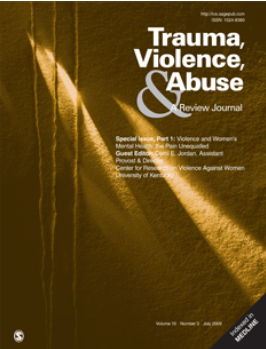Barriers and Facilitators of Help-Seeking Among Asian Women Survivors of Intimate Partner Violence in the United States: A Scoping Review.
IF 5.4
1区 社会学
Q1 CRIMINOLOGY & PENOLOGY
引用次数: 0
Abstract
Asian women survivors of intimate partner violence (IPV) often face compound challenges in addressing abuse and its negative consequences. While prior reviews have identified barriers to help-seeking, fewer have examined the factors that facilitate help-seeking. The current scoping review addresses this gap by synthesizing findings from 33 empirical studies published between 2003 and 2024 that explore the help-seeking experiences of Asian women IPV survivors in the United States. The review indicates that help-seeking is a non-linear, iterative process; the individuals or systems that survivors initially approach can significantly influence their subsequent actions. The reviewed studies suggest that women's help-seeking typically begins with recognizing that IPV is occurring and acknowledging it as an issue that needs to be addressed. When survivors seek support, facilitators include supportive informal and formal networks, as well as human and social capital, such as English proficiency, having U.S. citizenship or permanent residency, and transportation and financial independence. Once survivors engage with services, it is crucial that these services are comprehensive, bilingual, and culturally responsive. Survivor strengths, including self-efficacy, personal aspiration, and self-care practices, also play a critical role in fostering resilience. Implications focus on improving responses to IPV among informal networks and formal systems, including increasing IPV awareness through evidence-based tools, developing community-based strategies to transform social networks into sources of support, attuning interventions to survivors' help-seeking readiness, and ensuring services are linguistically and culturally appropriate.在美国遭受亲密伴侣暴力的亚洲女性幸存者中寻求帮助的障碍和促进因素:一项范围审查。
遭受亲密伴侣暴力的亚洲女性幸存者在处理虐待及其负面后果方面往往面临着复杂的挑战。虽然先前的审查已经确定了寻求帮助的障碍,但较少审查促进寻求帮助的因素。目前的范围审查通过综合2003年至2024年间发表的33项实证研究的结果来解决这一差距,这些研究探索了美国亚洲女性IPV幸存者的求助经历。综述表明,寻求帮助是一个非线性的、迭代的过程;幸存者最初接触的个人或系统会对他们随后的行动产生重大影响。经过审查的研究表明,妇女寻求帮助通常始于认识到IPV正在发生,并承认这是一个需要解决的问题。当幸存者寻求支持时,促进因素包括支持性的非正式和正式网络,以及人力和社会资本,如英语水平,拥有美国公民身份或永久居留权,交通和经济独立。一旦幸存者参与服务,至关重要的是,这些服务是全面的,双语的,和文化响应。幸存者的优势,包括自我效能、个人抱负和自我护理实践,在培养韧性方面也起着关键作用。影响重点在于改善非正式网络和正式系统对IPV的反应,包括通过循证工具提高对IPV的认识,制定以社区为基础的战略,将社会网络转变为支持来源,使干预措施适应幸存者寻求帮助的准备,并确保服务在语言和文化上是适当的。
本文章由计算机程序翻译,如有差异,请以英文原文为准。
求助全文
约1分钟内获得全文
求助全文
来源期刊

Trauma Violence & Abuse
Multiple-
CiteScore
13.60
自引率
7.80%
发文量
131
期刊介绍:
Trauma, Violence, & Abuse is devoted to organizing, synthesizing, and expanding knowledge on all force of trauma, abuse, and violence. This peer-reviewed journal is practitioner oriented and will publish only reviews of research, conceptual or theoretical articles, and law review articles. Trauma, Violence, & Abuse is dedicated to professionals and advanced students in clinical training who work with any form of trauma, abuse, and violence. It is intended to compile knowledge that clearly affects practice, policy, and research.
 求助内容:
求助内容: 应助结果提醒方式:
应助结果提醒方式:


